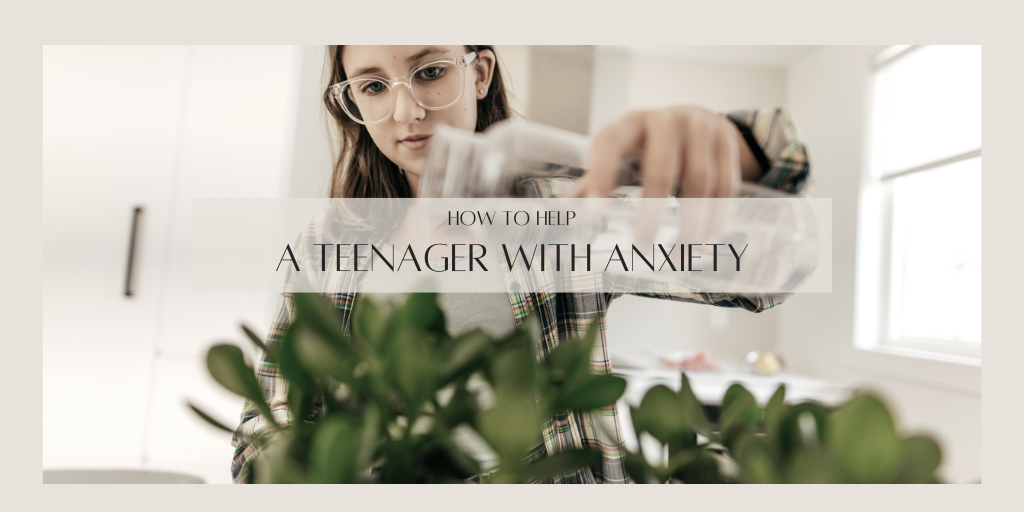Signs of teenage anxiety can be easily confused with stereotypical teenage behavior.
There are lots of kinds of anxiety.
In fact, it’s become such a buzzword in recent years that it’s sometimes hard to know what it means. That’s good and bad, right? It’s great to talk about mental health! It’s also important to understand that most teens feel anxiety from time to time, but 2 in every 25 teens will suffer from anxiety disorder.
That means at least 2 kids in every classroom suffer from some sort of anxiety!
Early detection can prevent anxiety from leading to further mental health issues. Plus, learning effective coping skills can make a huge impact on students’ success in school and in life.
So what are the signs of teen anxiety?
Anxiety can manifest differently in each individual, and it’s important for parents and school staff to be aware of the various signs and symptoms that may indicate a teen is struggling with anxiety.
Here are some common signs to look out for:
Excessive Fears and Worries
One of the hallmark signs of anxiety is the presence of excessive fears and worries that seem disproportionate to the situation. Teens may express intense fears about specific things, such as academic performance, social interactions, or their future.
Feelings of Inner Restlessness
Teens experiencing anxiety may often feel restless or on edge, even in situations where there is no apparent threat. This inner restlessness can manifest as difficulty sitting still, fidgeting, or constantly seeking distraction.
Excessive Vigilance or Over-Preparing
There may be a tendency for teens with anxiety to be excessively vigilant and cautious, constantly scanning their environment for potential threats or dangers. This heightened state of alertness can be exhausting and overwhelming for them.
Social Withdrawal or Unease
In social settings, teens with anxiety may appear dependent, withdrawn, or uneasy. They may struggle to engage in conversations, avoid social gatherings, or isolate themselves from peers due to fear of judgment or rejection. This is more than just being shy, though it can be very hard to tell the difference.
Learn more about Social Awkwardness in episode 80 of the podcast.
Emotional Dysregulation
Anxiety can also manifest in extremes of emotional expression. Some teens may appear overly restrained, keeping their emotions tightly controlled and avoiding situations that may trigger emotional responses. On the other hand, others may be overly emotional, experiencing frequent mood swings or outbursts of tears or anger. (Especially boys!)
Is it normal for teenagers to be angry?
Preoccupation with Losing Control or Social Competence
Teens with anxiety may be preoccupied with worries about losing control over themselves or their circumstances. They may have unrealistic concerns about their social competence, fearing that they will embarrass themselves or be unable to meet social expectations.
How can you help teens cope with anxiety?
Be a calming presence.
You don’t have to get on the emotional rollercoaster in order to help. In fact, that will almost definitely exacerbate the issue. Keep your own emotions in check and stay neutral.
Empathize, but don’t dwell on the negative.
Rule #1 of being around teenagers is to listen more than you lecture. In this case, listen first (!), but make sure you aren’t agreeing with a worst-case scenario they are imagining. That doesn’t mean toxic positivity either. Try to bring the emotion back to center if you can. Let them know that anxiety is uncomfortable and scary, but they can get through it.
Ask them to set positive, realistic expectations.
At Teen Life, we like to ask “what’s the worst that could happen?” Then we play out that scenario a little and follow up with “what’s the best possible outcome?” The reality is most likely somewhere in between.
Don’t try to label their emotions before they express them.
Don’t ask, “Are you worried about the math test?” Simply ask, “How do you feel about the math test you have coming up?”
Encourage healthy sleep and eating habits.
Everyone’s brain works better when we get outside, eat healthy, and sleep 8-10 hours a night. Model healthy habits and encourage your teen to join you!
6 Affirmations for Teens Experiencing Anxious Thoughts
(or adults!)
- You are brave.
- You are loved.
- You are a good person.
- You need help sometimes.
- You are kind.
- You are enough.
You’ve got this.
With your calming presence and support, even the most anxious teenager can learn to cope with their anxiety and over time it will usually become less.
Don’t be afraid to seek professional help if necessary. There are lots of different reasons for teens to have anxiety and for many of them, early intervention makes a huge difference in outcomes.
Be the One to Offer Solutions.
At Teen Life we talk about the idea of mental health supports as a way to access quality solutions for teenagers that bridge the gap between mental health issues and quality mental healthcare. Often, kids from hard places and those without means lack access to qualified counselors and psychiatrists. Sometimes this is a financial barrier, and other times access is prevented by cultural or social stigmas.
On top of providing Support Groups for kids from hard places and those in need of additional support, Teen Life is in the business of highlighting best practices for everyday mental well-being.
You can help by becoming a monthly donor. With less than you spend on coffee, a teenager can have access to a caring adult and a safe place to share their struggles and recognize their strengths.

Kelly Fann
Digital Media Manager
Kelly Fann | Digital Media Manager
Kelly has a desire to empower young people to grow into the best version of themselves. Using her background in branding and word-smithing, she is a master at highlighting resources that help teens learn skills that will enable them to grow and to adapt, to enjoy life and to be better citizens. Kelly has a MA in Linguistics from North Texas University.
